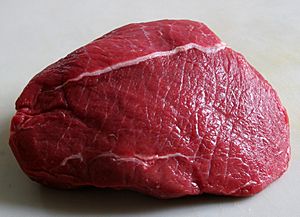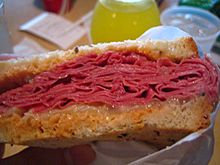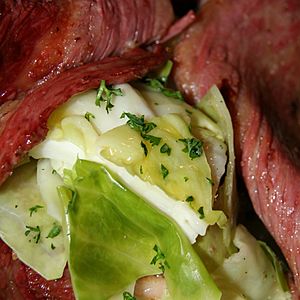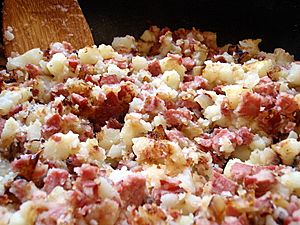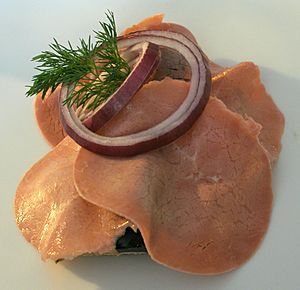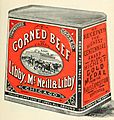Corned beef facts for kids
Corned beef is a type of beef that's prepared in a special way. It's first soaked in a salty water mix called brine. After soaking, it's cooked by simmering. People usually use cuts of meat with long muscle fibers, like the brisket, to make it.
The name "corned beef" comes from the coarse salt used in the pickling process. In old times, "corn" meant a small particle or grain of something. So, "corned" refers to the small "corns" of salt used to cure the meat.
Corned Beef in North America
In the United States and Canada, you can often buy corned beef at special food shops called delicatessens. One of the most famous sandwiches made with it is the Reuben sandwich. This hot sandwich has corned beef, Swiss cheese, sauerkraut (fermented cabbage), and Russian dressing. All these ingredients are placed between slices of rye bread and then grilled.
In some places, like Philadelphia, a cold sandwich called the Corned Beef Special is popular. It's made with steamed corned beef, coleslaw, and Russian Dressing on rye bread. This sandwich was first created in 1965.
Corned beef is also a big part of Saint Patrick's Day celebrations for Irish Americans. They often eat a traditional meal of corned beef and cabbage. While cabbage has always been a traditional Irish food, corned beef became popular in the late 1800s. Irish immigrants in New York City looked for a meat similar to their traditional Irish bacon. They learned about corned beef, which was a cheaper choice, from their Jewish neighbors.
You might also find corned beef in a dish called corned beef hash. This is often served for breakfast with eggs and hash browns.
If you take corned beef and then smoke it, often with extra spices like black pepper, it becomes a different kind of meat. This is called pastrami. In Canada, it's known as smoked meat.
Corned Beef Around the World
In the United Kingdom, corned beef is usually sold in cans. When served at a counter, it's often sliced from this canned meat. It's generally seen as a less expensive food. Most of it comes from Brazil and Argentina. It's also common to find canned corned beef in the United States. In the British Army and Royal Navy, it has been a basic part of soldiers' meals since before World War I. They call it bully-beef. You can also find American-style corned beef, known as "salt beef," in Jewish delicatessens in the UK.
In Denmark, corned beef has two names: saltkød (meaning "cured meat") or sprængt oksebryst (meaning "lightly salted beef brisket"). Each name describes a different way it's used. Saltkød is often used as a cold cut on sandwiches. It's a key part of a famous Danish open sandwich called smørrebrød. One special type is Dyrlægens natmad, which means "Veterinarian's midnight snack." This sandwich has a layer of liver paté, topped with a slice of corned beef and a slice of meat aspic. It's then decorated with raw onion rings and cress.
Sprængt oksebryst, on the other hand, is often served warm, but can also be eaten cold. Traditionally, it's served warm with boiled potatoes, horseradish sauce, and "pickles." These pickles are a mix of chopped, pickled vegetables like cauliflower, carrots, and onions in a yellow sauce.
Images for kids
-
Canned corned beef produced in Argentina for export to New Zealand, 1946
-
Tortang carne norte, a corned beef omelet from the Philippines
-
Filipino sopas (macaroni soup) with corned beef
-
Carne norte guisado of the Philippines with potatoes, onions, garlic, carrots, and tomatoes; it is eaten with white rice or bread
See also
 In Spanish: Corned beef para niños
In Spanish: Corned beef para niños
 | James B. Knighten |
 | Azellia White |
 | Willa Brown |


